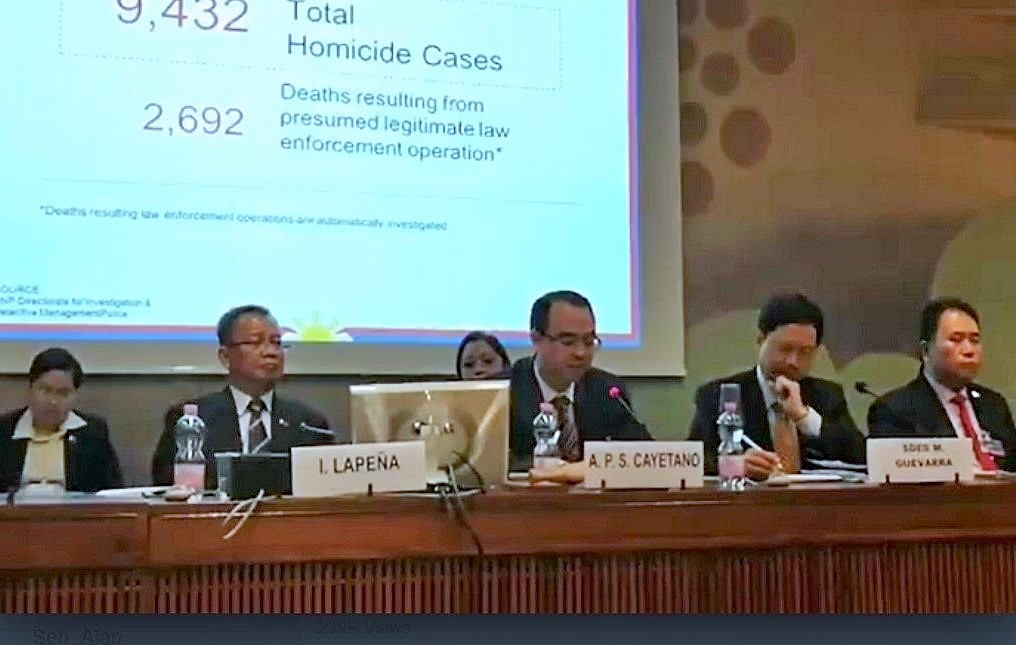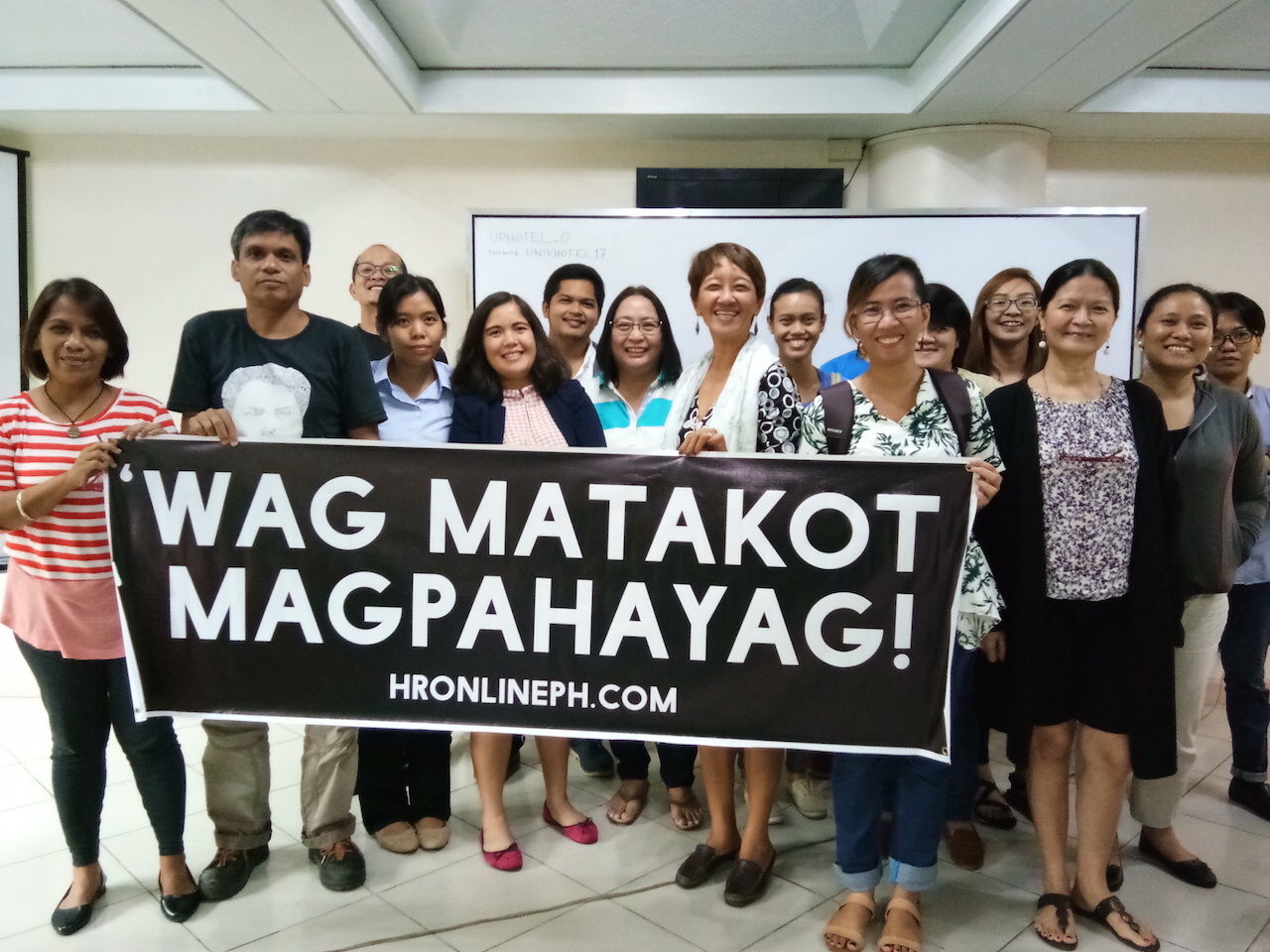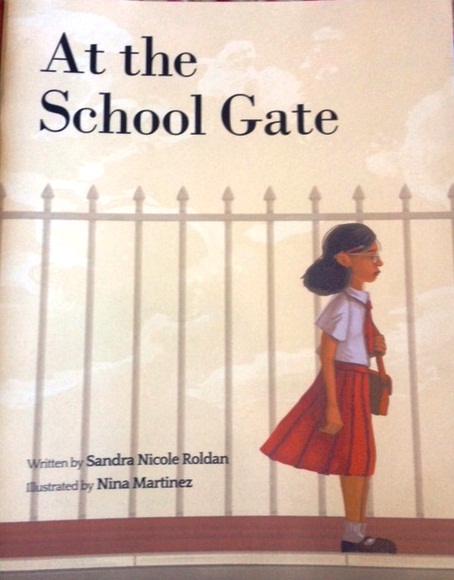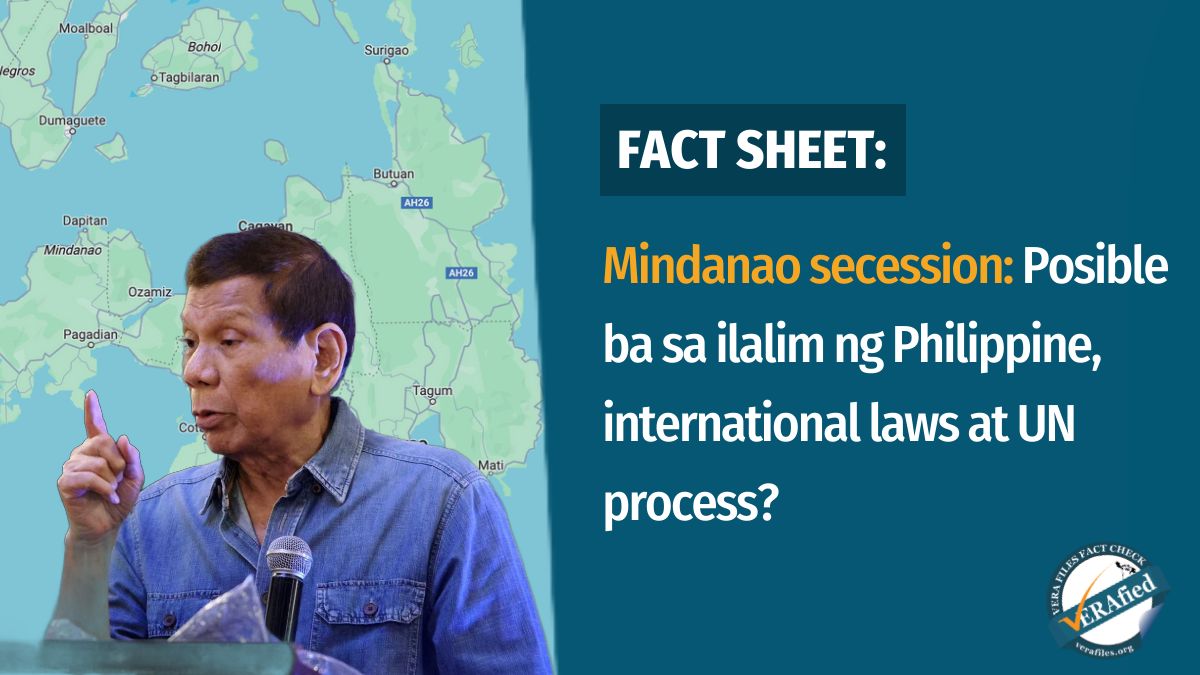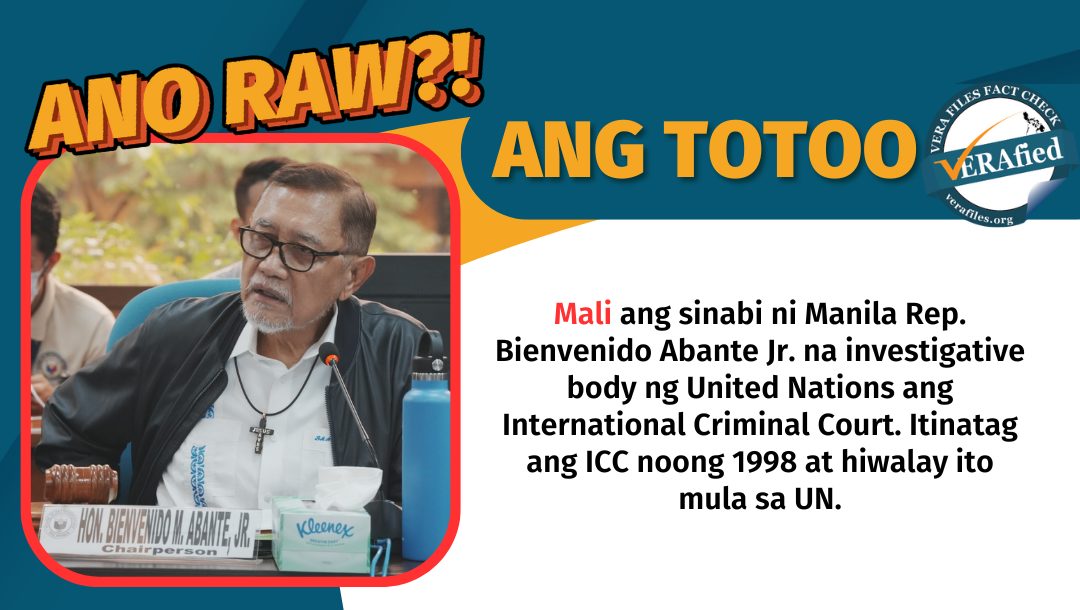In separate media releases, the Department of Foreign Affairs and the Presidential Communications Operations Office both spread fake news that misrepresented the outcome of the Philippine human rights report at the United Nations.
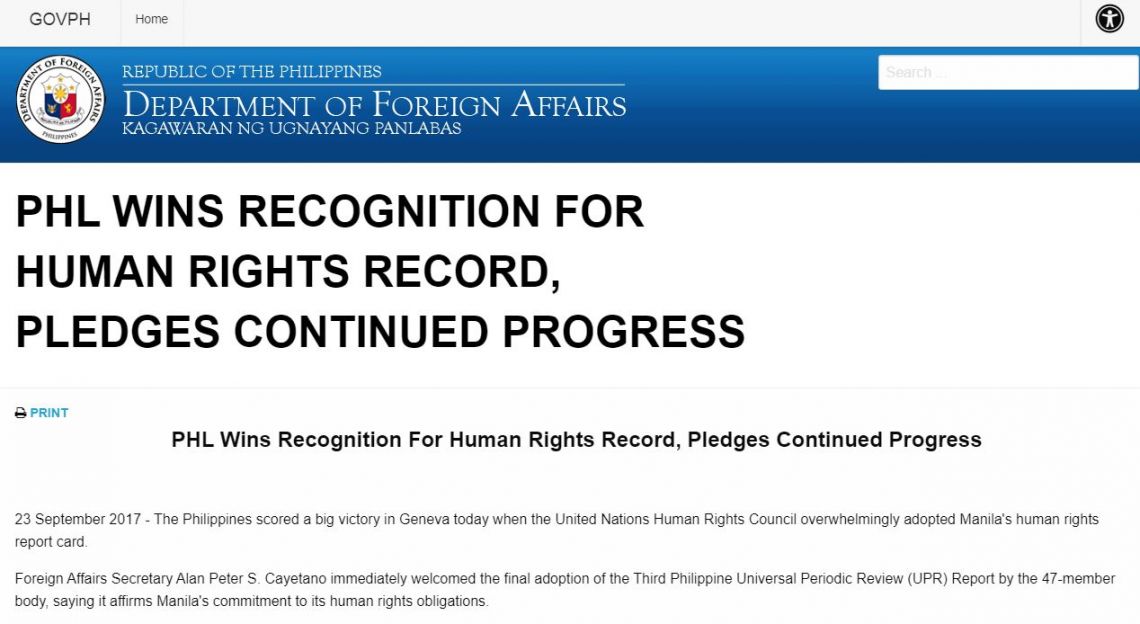
Screenshot of the Sept. 23 DFA media release.
“Fake news,” more than being just news, is about the mis- and disinformation ecosystem, noted First Draft, a nonprofit coalition formed “to raise awareness and address challenges relating to trust and truth in the digital age.”
First Draft lists misleading content and false context among the types of fake content, and partisanship, political influence and propaganda among the motivations for fake content creation.
STATEMENT
A Sept. 23 DFA media release, titled “Phl wins recognition for human rights record, pledges continued progress,” read:
“The Philippines scored a big victory in Geneva today when the United Nations Human Rights Council overwhelmingly adopted Manila’s human rights report card.”
Source: DFA, PHL Wins Recognition For Human Rights Record, Pledges Continued Progress
On the same day, the PCOO released a statement titled “Palace welcomes UN’s final and unanimous adoption of PH human rights report.” It said Malacañang:
“welcomed the United Nations Human Rights Council’s (UNHRC) final and unanimous adoption of the third Philippine Universal Periodic Review (UPR) Report, which reaffirms the government’s commitment to human rights protection.”
Source: PCOO, Palace welcomes UN’s final and unanimous adoption of PH human rights report
The UPR is a process done every five years to review the human rights records of UN member states. Foreign Affairs Secretary Alan Peter Cayetano presented the rights situation of the country in May.
The PCOO media release, indirectly quoting Presidential Spokesperson Ernesto Abella, further noted that:
“the unanimous adoption of the UPR Report in Geneva signifies the UN’s recognition of the country’s human rights record under the leadership of President Rodrigo Roa Duterte.”
FACT
The DFA and PCOO media releases have made a mountain of the procedural adoption of the Philippine report.
“Lahat naman ng countries na nagre-report, ina-accept yung submission (All country reports that are submitted are accepted),” Lauro Baja, a former Philippine Permanent Representative to the UN, told VERA Files.
Calling this a “big victory” in Geneva, per DFA, or a UN “recognition” of the Philippine human rights record under Duterte, per PCOO, upends what has actually been a disappointing UPR outcome for the country relative to other UN member states.
The UN Human Rights Council, in an email to VERA Files, said:
“The facts are: The Philippines received 257 recommendations, of which they have supported 103 (committed to implement or already underway), or 40%. The average amount of recommendations posed to each State during these reviews is approx. 200. On average 80% of these are supported by States.”
The Philippines described the recommendations it could not support as:
- “Beyond the sole control of any of the branches of the government”
- “Perceived to insinuate, advertently or inadvertently, that the State has not taken any action whatsoever on the concerns raised”
- “Sweeping, vague and even contradictory, especially in the context of the Philippines’ democratic processes”
Source: Philippines response to UN Human Rights Council recommendations
“It means the Philippines will NOT act on those recommendations,” said lawyer Ruben Carranza of the International Center for Transitional Justice in an online message.
“That isn’t a victory; it is a loss – of credibility, of face, of any claim to being a human rights-fulfilling State on the part of the Philippines,” Carranza added.
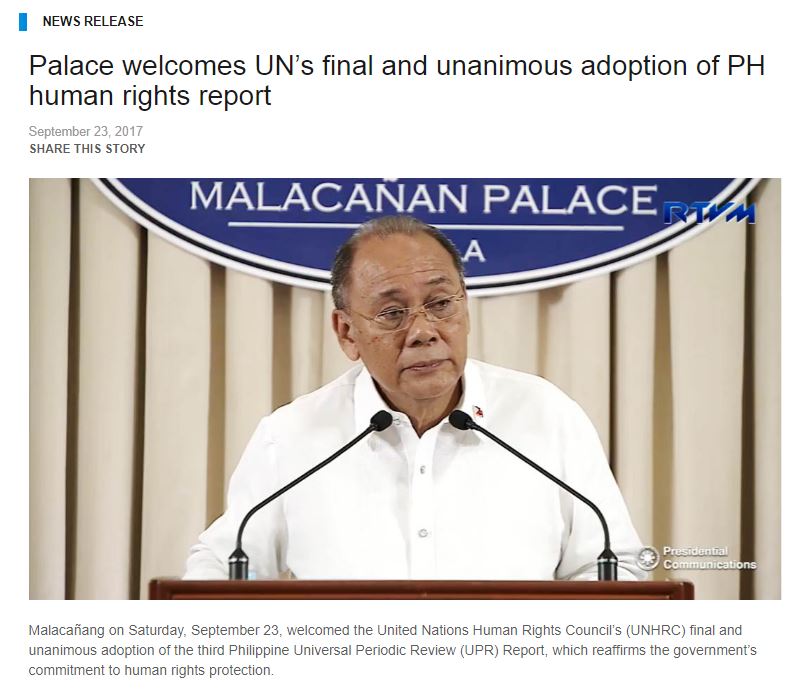
Screenshot of the Sept. 23 DFA media release.
More disinformation: that the Philippine report was “overwhelmingly adopted,” per DFA, or there was “unanimous adoption,” per PCOO.
Of the 14 countries that spoke during the adoption of the Philippine UPR outcome, at least four noted some issues:
- Sierra Leone: Efforts aimed at eradicating the abuse of illegal drugs should not be detrimental to fundamental human rights and freedoms.
- Sudan: Recommendation for the Philippines to accede to the Convention on Enforced Disappearances had not been accepted.
- United Kingdom: Regretted that its recommendations were not accepted by the Philippines; remained concerned about the high death toll associated with the campaign against illegal drugs and statements questioning the universality of human rights; continuing threats against human rights defenders were also of grave concern.
- United States: Remained concerned about ongoing reports of extrajudicial killings and called on the Philippines to ensure that investigations were conducted with respect for human rights and the rule of law.
Source: UN Office of the High Commissioner for Human Rights, Human Rights Council adopts Universal Periodic Review outcomes of Philippines, Algeria and Poland
Nongovernment organizations, which are allowed to submit information for consideration during the UPR review, also spoke.
Among the statements, unanimous and overwhelming in raising concern about the human rights situation in the Philippines, are:
- Save the Children International, in a joint statement with International Volunteerism Organization for Women, Education and Development: Concerned that the war on drugs campaign of the Government had claimed the lives of 54 children.
- Franciscans International: Concerned about the serious deterioration of the human rights situation in the Philippines.
- Global Initiative for Economic, Social and Cultural Rights: Barely five months since the Government presented its report, parts of the country had become a virtual inferno, with incessant bombings by the military in Marawi and brutal killings by the police every day.
Source: UN Office of the High Commissioner for Human Rights, Human Rights Council adopts Universal Periodic Review outcomes of Philippines, Algeria and Poland
BACKSTORY
The DFA and PCOO fake news, by VERA Files’ count, is the fourth time the Philippine government has spread fake content around the UPR and the country’s human rights situation.
On Sept. 13, a DFA media release claimed that, “Many UN Member States, especially those from ASEAN and developing countries, expressed support for the efforts of the Philippines to address the drug menace.” Wrong.
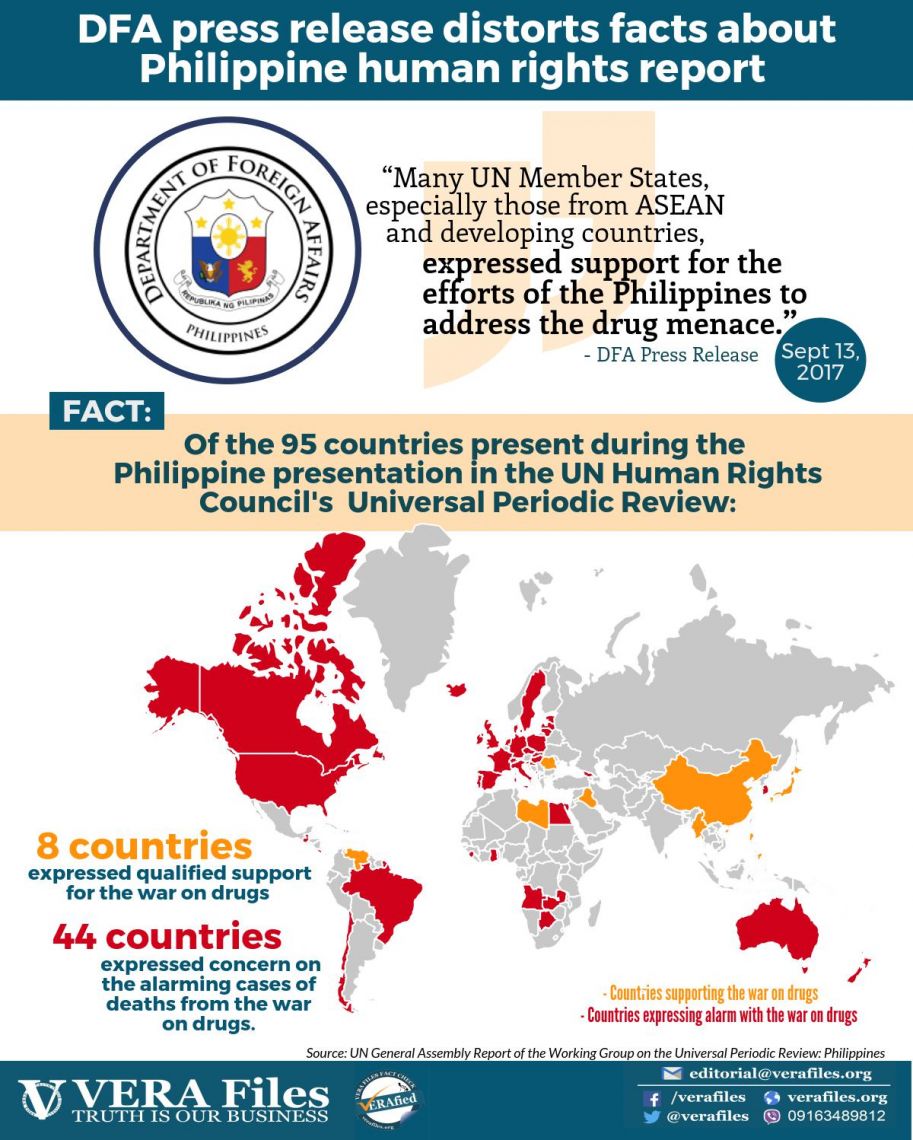
On May 20, the state-run Philippine News Agency ran a fake news report claiming 95 countries in the UPR were convinced that there were no extrajudicial killings in the Philippines. Wrong.
On May 8, Foreign Affairs Secretary Cayetano, who represented the Philippines at the UPR, told the UN President Duterte “has a policy of zero tolerance for abuse of law enforcers.” Wrong.
Sources:
UN Office of the High Commissioner for Human Rights (OHCHR), Human Rights Council adopts Universal Periodic Review outcomes of Philippines, Algeria and Poland
OHCHR, Basic facts about the UPR
United Nations General Assembly, Report of the Working Group on the Universal Periodic Review: Philippines
United Nations Human Rights Council, Philippines response to UN Human Rights Council recommendations in the 3rd cycle of the Universal Periodic Review of the Philippines, 8 May 2017
First Draft, Fake news. It’s complicated.
Interview with Lauro Baja, former Philippine Permanent Representative to the United Nations
Interview with Ruben Carranza, Director, Reparative Justice Program, International Center for Transitional Justice
(Guided by the code of principles of the International Fact-Checking Network at Poynter, VERA Files tracks the false claims, flip-flops, misleading statements of public officials and figures, and debunks them with factual evidence. Find out more about this initiative.)

